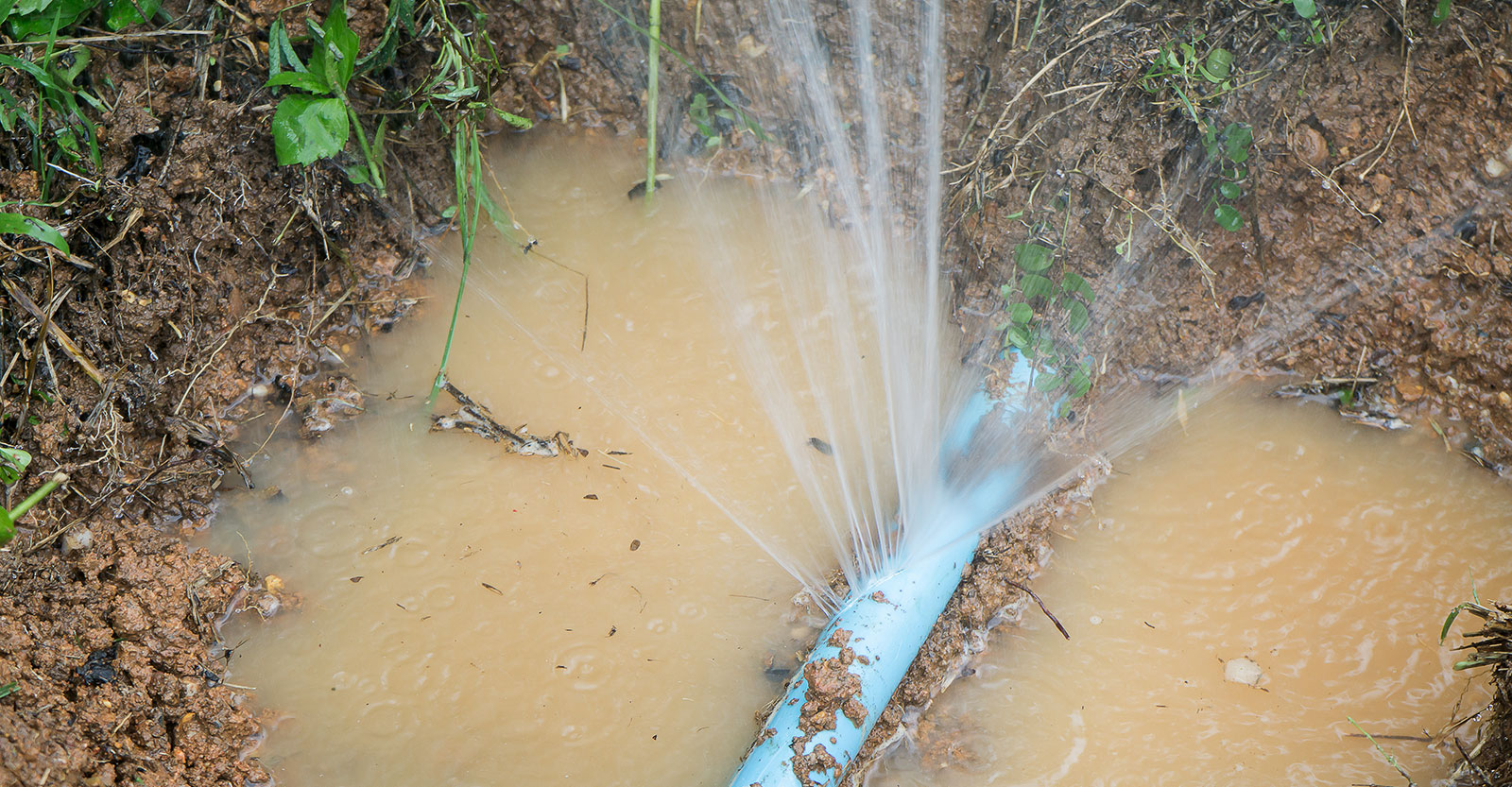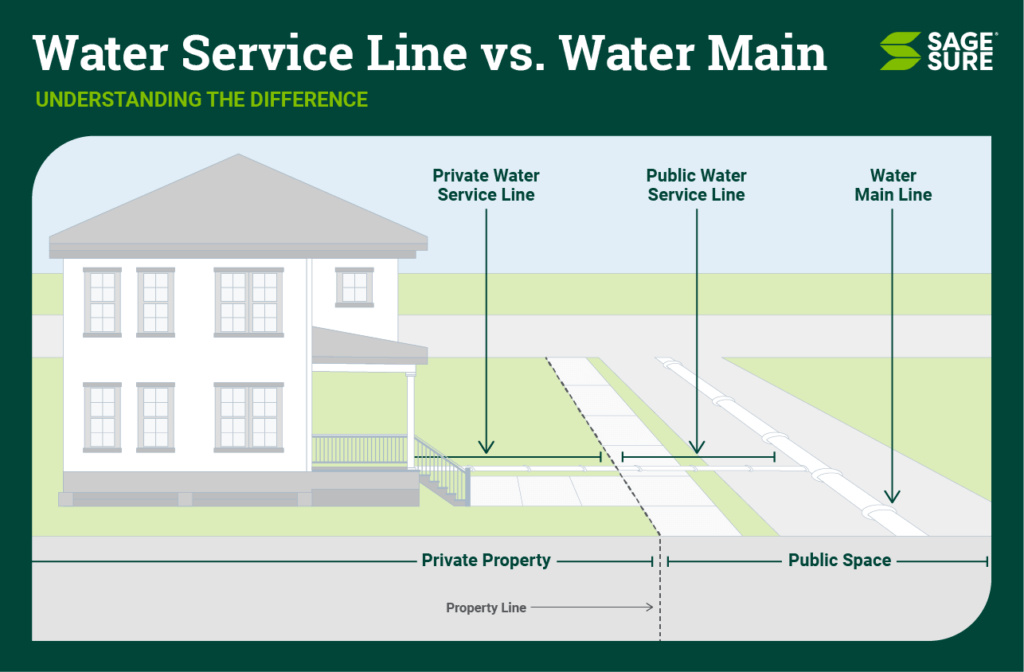
Water Main Breaks: Who Is Responsible for Repairs?
July 10, 2024 — Homeowner insights
Water lines, an intricate underground system of pipes and supply lines that provide clean water to your home or business, are often forgotten—until something goes wrong. Water line breaks can cause significant inconvenience and expense for the responsible party.
Let’s take a closer look at how water is supplied to your home or business, how to know if you have a water line leak, when you’re responsible for the repair as a property owner, and how to protect yourself from costly fixes. But first, let’s establish what a water service line is and how it’s different from a water main.
WHAT’S THE DIFFERENCE BETWEEN A WATER SERVICE LINE AND A WATER MAIN?
A water main is the “main” pipe installed by the city or town and carries water several miles underground. A water main has smaller lines that run off it to supply water to the plumbing systems of individual properties called water service lines. A water service line typically connects to the water main at your water meter where your usage is measured for billing purposes.

As with any infrastructure, water mains and water service lines are susceptible to disruption. More than 240,000 water mains break per year in the U.S, according to the United States Environmental Protection Agency.
WHO’S RESPONSIBLE FOR REPAIRING WATER SUPPLY BREAKS?
The short answer is that it depends. As a home or business owner, you oversee the water service line on your property. However, water delivery systems are large and a bit complex, so who is held liable for fixing issues and paying for repairs depends on where the problem is located.
When a water main break occurs on public property, it is generally the responsibility of the town, city, water utility company, or other public agency that oversees water distribution to fix it. However, as a homeowner, you are responsible for the water service lines extending from the water main on the street to your home, and that includes repairs.
WHAT CAUSES WATER SERVICE LINE AND WATER MAIN BREAKS?
Common causes of water line failures for both water mains and water services lines begin with environmental factors. Variations in weather and temperature can cause shifts and changes to the environment around pipes. When soil composition changes from dry to wet, underground pipes will occasionally shift. A variety of other issues, from age to improper installation or lack of maintenance, can also cause water pipes to crack or leak.
Some of the most common causes of water line breaks are:
- Corrosion: Over time, the material of the pipes reacts to the environment and corrodes, which erodes the integrity of the pipes and weakens their structure.
- Environment: Weather impacts the soil and environment surrounding the pipes, which can stress the structure and lead to cracks or breaks. Soil comprised of clay or sand is less stable and can increase the risk of failure.
- High Water Flow: Increases in water flow through pipes also increases pressure in the pipes. Increased usage or demand, power outages, and pump failures all impact the water flow, which can affect pipe integrity.
- Improper Installation: Pipes installed without proper support can cause misalignment, resulting in breakage over time.
- Lack of Maintenance: Failing to inspect pipes or fix minor leaks can lead to larger problems.
- Age: Older pipes may fail more often than those made with newer materials.
Because a water supply system is underground, problems aren’t always obvious. But whenever possible, discovering leaks before extensive damage occurs can decrease damage and loss.
HOW DO I KNOW IF A WATER LINE IS LEAKING?
Several signs can indicate a water service line leak. If you experience any of the following, report the issues to your water company or a trusted plumber for inspection.
- Low water pressure not localized to one fixture.
- Cracks in your home’s foundation, which can signify pressure buildup from leaking water underground.
- Water coming up from the ground or sinkholes.
- Unexplainable increases to your water bill from increased water usage.
- Unpleasant odor from stagnant water.
- Damp drywall from water intrusion.
- Water pooling or puddling inside your home.
Be sure to assess your property for these signs during your seasonal home maintenance checks and know what to do if you suspect a leak or problem with your water main.
WHAT SHOULD I DO IF THERE IS A WATER SERVICE LINE BREAK ON MY PROPERTY?
If you think you have a water main or service line leak, you’ll need to assess the problem, determine if you can stop the leak, and then contact a professional to fix the problem. Here’s a deeper look at how to navigate a water pipe leak:
- Assess the damage: Determine the severity of the problem by inspecting the area around the suspected leak. It may be necessary to turn off your main water supply to prevent further water damage. If there is an extensive leak, secure the area and alert neighbors to the potential dangers, including water contamination and standing water risks for small children and pets.
- Contact your water supplier: Notify your water supply provider of the problem. This might be a water utility company or public works department. Once you explain the extent and location of the problem, they may send a crew to assess the situation and resolve the issue.
- Document the damage: Take pictures and videos of the location of the break and any damage to your property. If you purchase supplies or hire a professional, keep your receipts as well. If you have service line coverage and file a claim, this documentation will provide your insurer with an accurate representation of the situation.
- Hire a professional: If the location of the water service line break is on your property, you will likely be responsible for the repair. Depending on the complexity of the situation, you will likely want to hire a professional plumber for the specialized equipment and expertise to safely handle the repair.
- Understand your insurance coverage: A standard homeowners policy typically does not include insurance for water service line breaks and subsequent damage. However, if you have exterior water service line coverage, the damage and repairs may be covered. Contact your insurance representative for support.
- Stay safe: Water breaks can compromise water quality if it leads to contamination. Follow the guidelines from your local health department or water utility company. When in doubt, boil or use bottled water until the repair is complete. Be sure to notify neighbors who may be impacted by the location of the leak.
HOW MUCH DOES THE AVERAGE WATER SERVICE LINE REPAIR COST?
According to Home Advisor the national average cost for a main water line repair is $1,005. Smaller repairs may cost a few hundred dollars, whereas complex repairs may total nearly $4,000.
The cost to repair a water service line varies based on complexity, materials, and location. Common repairs include a water leak, a rusted or corroded water line, and leaky or faulty valves.
DOES HOMEOWNERS INSURANCE COVER MAIN WATER LINE REPLACEMENT?
Standard homeowners insurance policies do not cover damage from main water line breaks or any resulting water damage to your home, meaning you would have to cover repairs you’re responsible for out of pocket.
To protect your home and help cover the cost, you might consider adding a service line endorsement to your existing policy. SageSure offers service line coverage that provides up to $10,000 of protection for less than $5 a month. Service line coverage isn’t limited to water service lines. It can also apply to your underground electrical, sewer, natural gas lines, and connectivity cables.
Service line coverage can:
- Help property owners avoid the repair or replacement costs for damaged or failed lines.
- Replace outdoor property affected by a failure or damage from the required excavation of a covered repair.
- Pay for temporary repairs to stop further damage.
- Offer reimbursement for additional living expenses incurred during the outage.
A service line endorsement can offer coverage for the following types of damage to service lines:
- Wear and tear
- Rust
- Freezing
- Deterioration
- Hidden or latent defects
- Mechanical breakdown
- Electrical breakdown
- Corrosion
- Decay
- Collapse, not including sinkhole or subsidence collapse
Ready to protect your home and pocketbook from the unexpected water service line breaks? Talk to your insurance representative to learn more about adding a service line endorsement to your policy.
